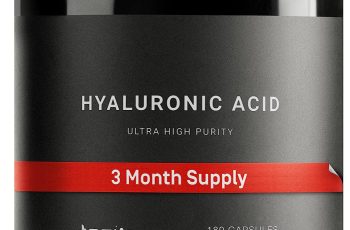Are you looking for a natural way to boost your energy levels and enhance your metabolism? Look no further than L-Carnitine! This powerful amino acid derivative has gained popularity for its numerous benefits in promoting energy production and overall health.
L-Carnitine plays a crucial role in the transport of long-chain fatty acids into the mitochondria, where they are converted into ATP, the body’s main source of energy. By facilitating this process, L-Carnitine supports optimal energy production, helping you feel more energized throughout the day.
Not only does L-Carnitine boost energy levels, but it also aids in the removal of toxic compounds from the mitochondria. This detoxification process ensures the efficient functioning of your cells, promoting overall health and well-being.
While L-Carnitine is naturally present in various foods, including animal products such as meat, fish, and dairy, nutritional supplements can provide an additional source of this beneficial compound. L-Carnitine supplements are available in various forms, making it convenient for individuals to incorporate them into their daily routine.
Whether you’re an athlete looking to improve performance, someone aiming for weight loss, or simply seeking a natural energy boost, L-Carnitine can be an excellent addition to your wellness regimen.
Key Takeaways:
- L-Carnitine helps boost energy levels by facilitating the transport of fatty acids into the mitochondria for energy production.
- Supplementing with L-Carnitine can aid in the removal of toxic compounds from the mitochondria, promoting overall cellular health.
- L-Carnitine is naturally present in animal products and can also be obtained through nutritional supplements.
- Individuals can benefit from L-Carnitine supplementation for improved energy, weight management, and athletic performance.
- Consult with a healthcare professional for personalized guidance on dosage and usage of L-Carnitine as a dietary supplement.
How Does L-Carnitine Work in the Body?
In the body, carnitine is synthesized from the amino acids lysine and methionine in the liver, kidneys, and brain. It is concentrated in tissues that metabolize fatty acids as a fuel source, with the majority stored in the heart and skeletal muscle. L-carnitine is essential for the transport of fatty acids into the mitochondria for fatty acid oxidation and energy production. Additionally, it helps remove toxic compounds from the mitochondria, contributing to mitochondrial function. The body is capable of synthesizing enough carnitine to meet its needs in healthy individuals. However, certain conditions, such as premature birth or kidney dysfunction, may require additional carnitine intake.
Dietary Sources of Carnitine
When it comes to obtaining carnitine, there are primarily two sources: dietary intake and supplements. Let’s explore the dietary sources first.
Carnitine is naturally present in various animal products, making it easier for carnivores to include it in their diet. Red meat, such as beef steak and ground beef, is particularly rich in carnitine. Poultry, fish, and dairy products also contain small amounts of this essential nutrient.
On the other hand, plant-based foods like vegetables, fruits, and grains provide negligible amounts of carnitine. So, if you follow a vegetarian or vegan diet, it is important to consider alternative options to ensure adequate carnitine intake.
To give you a better idea, here are some common foods and their carnitine content:
| Food | Carnitine Content (mg per serving) |
|---|---|
| Beef steak (4 ounces) | 56-162 |
| Ground beef (4 ounces) | 87-99 |
| Milk (1 cup) | 8 |
| Codfish (4 ounces) | 4-7 |
| Chicken breast (4 ounces) | 3-5 |
| Ice cream (1/2 cup) | 3-4 |
| Cheese (1 ounce) | 2-6 |
| Whole-wheat bread (1 slice) | 0.16 |
| Asparagus (1/2 cup) | 0.13 |
These values may vary slightly depending on factors such as the method of cooking and the animal’s diet. It is important to note that the bioavailability of dietary carnitine ranges from approximately 63% to 75%, meaning not all of the carnitine consumed is effectively absorbed by the body.
If the dietary intake of carnitine is insufficient or if you have specific health needs, you may consider carnitine supplementation. However, it is always recommended to consult with a healthcare professional before starting any supplements.
Carnitine Supplementation
When it comes to boosting your body’s energy production and metabolism, carnitine supplementation can be an excellent option. Available in various forms, including L-carnitine and acetyl-L-carnitine, these supplements offer a convenient way to increase your carnitine levels and support overall health.
When considering carnitine supplementation, it’s important to determine the recommended dosage based on your individual needs and health conditions. Consulting with a healthcare professional can help determine the appropriate dosage to help you achieve optimal results.
However, it’s worth noting that the bioavailability of supplemental L-carnitine is lower than that of dietary carnitine. While the body can efficiently absorb and utilize dietary carnitine, the absorption of supplemental L-carnitine is approximately 14-18%. This means that you may need to adjust the dosage to account for the lower bioavailability of the supplement.
Overall, carnitine supplementation can be a valuable addition to your health and wellness routine. It offers a convenient and effective way to increase your carnitine levels and support energy production and metabolism.
Carnitine Deficiency and Inadequacy
Carnitine deficiency is a condition that can result from genetic disorders or certain health conditions that affect the body’s ability to produce or excrete carnitine. There are two types of carnitine deficiency: primary carnitine deficiency and secondary carnitine deficiency.
Primary carnitine deficiency is a rare genetic disorder that impairs the body’s ability to transport carnitine into cells, leading to a deficiency. This condition is usually diagnosed in childhood and can cause symptoms such as muscle weakness, fatigue, and cardiac abnormalities.
Secondary carnitine deficiency, on the other hand, is caused by certain health conditions that disrupt the synthesis or excretion of carnitine. These conditions can include chronic kidney disease, liver disease, and certain medications. Symptoms of secondary carnitine deficiency may include muscle weakness, fatigue, abnormal heart rhythms, and liver dysfunction.
Carnitine supplementation is often used to manage carnitine deficiencies and can effectively resolve the associated symptoms. By supplementing with carnitine, individuals can increase their carnitine levels and restore normal functioning in the body. It’s important to consult with a healthcare professional to determine the appropriate dosage and duration of supplementation for each individual’s specific needs.

Health Benefits of L-Carnitine
L-Carnitine offers a range of potential health benefits in various conditions. Its effects on brain function have been a subject of interest, with studies suggesting that it may support cognitive performance and potentially alleviate symptoms of neurodegenerative diseases. This nutrient has also been associated with weight loss and fat metabolism, making it a popular choice among individuals aiming to manage their weight effectively. Moreover, L-Carnitine is widely used by athletes to enhance performance, improve exercise recovery, and reduce muscle soreness.
Research has indicated that L-Carnitine may have a positive impact on brain function, supporting cognitive health and performance. Studies have explored its potential in improving memory, attention span, and overall mental function. By enhancing brain energy metabolism, L-Carnitine may contribute to optimal brain performance and promote overall cognitive well-being.
When it comes to weight management, L-Carnitine has gained attention for its potential benefits. This nutrient plays a crucial role in the transportation of fatty acids into the mitochondria, where they are utilized as a source of energy. By facilitating fat metabolism, L-Carnitine may aid in weight loss efforts and promote healthy body composition.
In the realm of sports and athletics, L-Carnitine is recognized for its ability to enhance performance and support exercise recovery. By improving the utilization of fatty acids as a fuel source during physical activity, L-Carnitine can help athletes sustain energy levels and delay fatigue. Furthermore, it may contribute to reducing muscle soreness, allowing for faster recovery between training sessions.
Safety and Side Effects of L-Carnitine
When it comes to supplementing with L-Carnitine, safety is a top priority. In general, L-Carnitine is considered safe for most individuals when taken within the recommended dosage range of up to 2 grams per day.
However, it’s important to note that higher doses may cause mild side effects such as heartburn and indigestion. To ensure the best results and minimize any potential risks, it is recommended to consult with a healthcare professional before starting any L-Carnitine supplementation.
A healthcare professional can provide personalized guidance on the proper dosage based on your specific needs and health conditions. They can also help identify any potential interactions with medications you may be taking or existing health conditions you may have.
It is worth mentioning that high levels of L-Carnitine supplementation have been associated with increased blood levels of trimethylamine-N-oxide (TMAO), which is linked to a heightened risk of atherosclerosis. Therefore, it is important to adhere to the recommended dosage and not exceed the suggested amount.

Conclusion
In conclusion, L-Carnitine offers numerous benefits for energy metabolism, weight management, and overall health. Its crucial role in transporting fatty acids into the mitochondria for energy production and removing toxic compounds makes it an essential nutrient. By supplementing with L-Carnitine, individuals may experience increased energy levels, enhanced exercise performance, and support for their weight loss efforts.
However, it is essential to consult with a healthcare professional before incorporating L-Carnitine supplementation into your routine. They can provide personalized guidance on the appropriate dosage and ensure safe and effective use. Working with a healthcare professional is especially important if you have any underlying medical conditions or are taking other medications.
Remember that L-Carnitine supplements should be used as part of a healthy and balanced lifestyle. It is not a magic solution for weight loss or energy enhancement on its own. Regular exercise, a nutritious diet, and other healthy habits are crucial for achieving optimal results.
FAQ
What are the benefits of L-Carnitine?
L-Carnitine offers several benefits, including increased energy production, improved metabolism, and enhanced exercise performance. It can also support weight loss efforts and potentially alleviate symptoms of neurodegenerative diseases.
How does L-Carnitine work in the body?
L-Carnitine plays a critical role in energy production by facilitating the transport of fatty acids into the mitochondria, where they are oxidized to produce ATP. It also helps eliminate toxic compounds from the mitochondria, promoting overall cellular health.
What are the dietary sources of carnitine?
Carnitine is naturally present in animal products, such as red meat, poultry, fish, and dairy. Small amounts of carnitine can also be found in vegetables, fruits, and grains, but they provide negligible levels of this nutrient.
Can I take L-Carnitine as a supplement?
Yes, L-Carnitine is available as a dietary supplement. It comes in various forms, such as L-Carnitine and acetyl-L-Carnitine. The recommended dosage of L-Carnitine supplementation varies depending on individual needs and health conditions.
What are the signs of carnitine deficiency?
Carnitine deficiency can manifest as muscle weakness, fatigue, abnormal heart rhythms, and liver dysfunction. It can occur due to genetic disorders or certain health conditions that affect carnitine synthesis or excretion.
How does L-Carnitine benefit the brain?
L-Carnitine is believed to support brain function and improve cognitive performance. It may also have potential benefits in managing symptoms of neurodegenerative diseases.
Does L-Carnitine help with weight loss?
Yes, L-Carnitine has been associated with weight loss and fat metabolism. It can potentially enhance the body’s ability to burn fat for fuel, making it a popular supplement for individuals seeking weight management support.
Is L-Carnitine safe to use? Are there any side effects?
L-Carnitine is generally safe for most individuals when taken within the recommended dosage range. However, higher doses may lead to mild side effects like heartburn and indigestion. It is important to consult with a healthcare professional before starting any supplementation.




